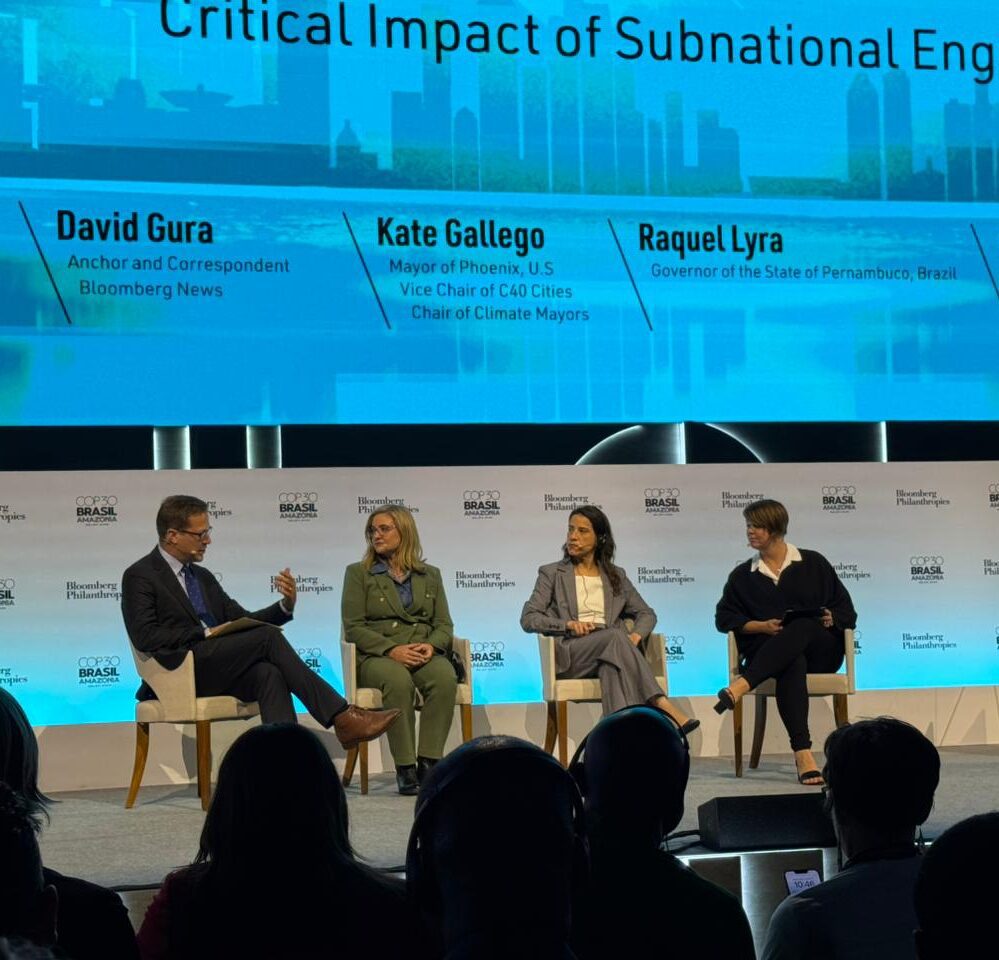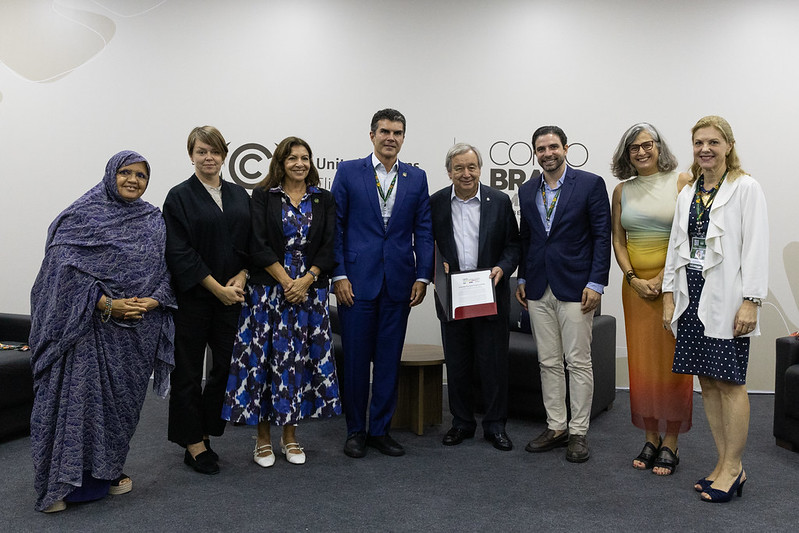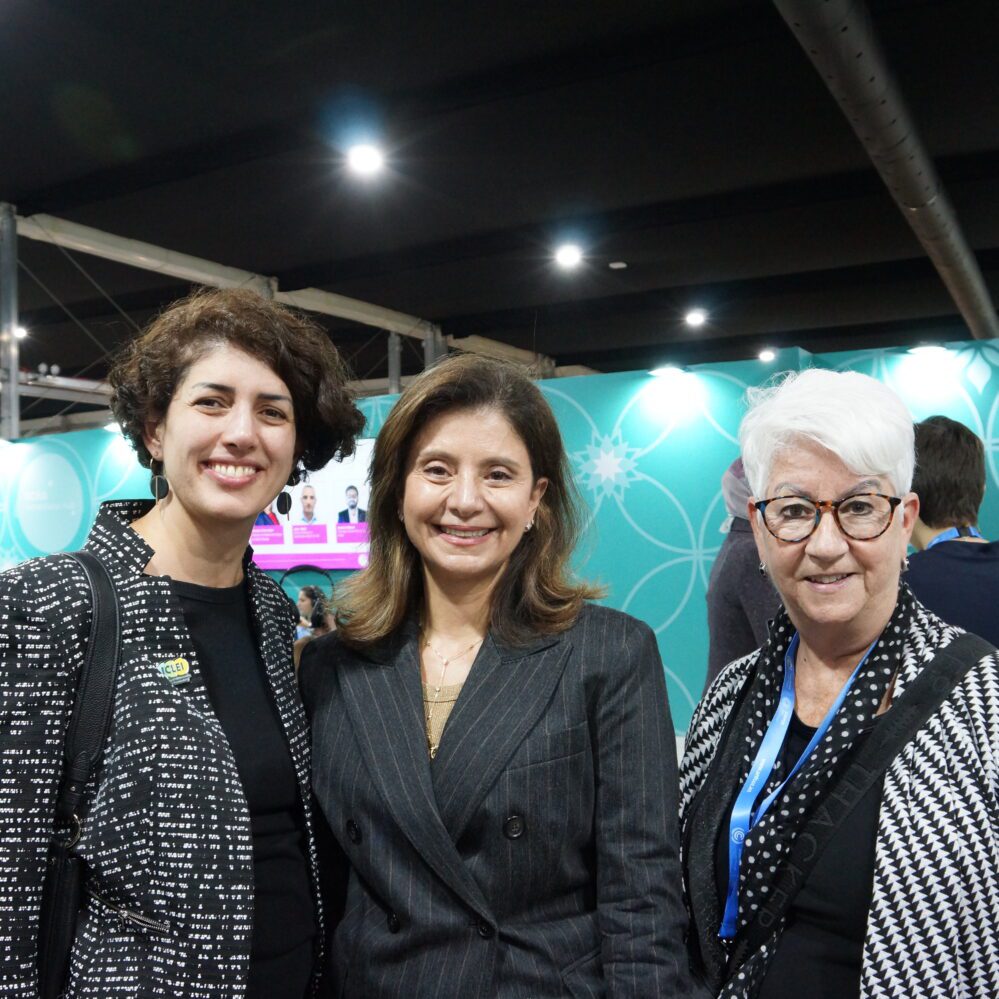Adaptation is local, but real progress depends on collective action, finance, and listening to communities.
“Cities respond first. We experience the risk directly -heat waves, drought, extreme weather events- but we are also already adapting and delivering solutions, and our efforts show that local ambition is alive,” said ICLEI Vice President Mohamed Sefiani, Mayor of Chefchaouen, Morocco, at the COP30 session Local Leadership for Global Adaptation: Connecting Ambition, Action & Resilience.
Co-organized by the International Federation of Red Cross and Red Crescent Societies (IFRC), ICLEI, and the Lincoln Institute of Land Policy on 19 November, the session brought together mayors, experts, and researchers to show how locally-led adaptation is already transforming cities, and what must change in the global system to match that ambition.
Yunus Arikan, ICLEI Director of Global Advocacy and LGMA Focal Point, reminded participants that the Paris Agreement already anchors adaptation at the local level, but that practice must now catch up with this mandate.
“It has to be much more integrated, holistic, and coordinated with all levels of government and across all government departments,” he said, stressing that national adaptation plans and indicators must reflect local realities if they are to drive meaningful change.
From the humanitarian perspective, Aditya Bahadur, Director of the Red Cross Red Crescent Climate Centre, reframed the adaptation debate around people’s daily lives: “One of the key messages that we are repeating is that the climate crisis is a health crisis, and we cannot separate the two.” In addition, he calls to join the #BeatTheHeat campaign to raise awareness about extreme heat impacts in people’s health.
He highlighted that only a small share of climate finance currently reaches the local level and called for more and better funding, anticipatory action, and universal early warning systems to protect communities facing multiple, overlapping risks.
Building on this, May Aung, Senior Researcher at IIED, highlighted how the eight principles of locally-led adaptation offer a concrete framework for donors and climate funds to reform their contracts, procedures, and resource flows so that finance truly reaches local actors. She stressed that evidence of successful locally-led adaptation already exists on the ground, but needs to be aggregated and translated into practical guidance that can drive institutional change. IIED ‘s Practical guidance for aligning operations with the LLA principles shows how funders and international intermediaries can give local partners space to manoeuvre.
Locally-led solutions in practice: from Teresina’s wetlands to Chefchaouen’s green city
Concrete examples from cities showed what locally-led adaptation looks like on the ground. Elisa Carvalho, Agenda 2030 Technical Advisor from Teresina, Brazil, described how the city is combining research and community-based planning to tackle heat and flood risk, including one of Brazil’s first primary databases on the impacts of heat on pregnancy and long-term work with the World Bank to make the Lagoas do Norte region, a wetland area, more resilient, including flood control, sanitation, and sustainable urban development.
“It’s important for national governments to really understand its context and its people, to listen to local governments and also to build together,” she said, emphasizing that projects designed with communities create stronger and more trusted adaptation outcomes.
Mayor Sefiani complemented this with the experience of Chefchaouen, a small mountain city known for its blue-painted streets but increasingly recognized for its green leadership. He explained how the city’s climate action plan links protecting natural landscapes, improving water efficiency and promoting sustainable local economies with investments in climate-smart infrastructure, modernized public lighting, solar systems, energy and climate information centers, and nature-based solutions through ecotourism and initiatives such as CitiesWithNature.
These efforts, he noted, are only possible thanks to close collaboration with residents, national authorities and international networks like ICLEI, which help turn local experience into lasting policy.
As negotiations in Belém move towards final decisions, Mayor Sefiani’s concluded with a message to the UNFCCC process and Parties:
“Cities and towns are already adapting. We are already delivering solutions. We are ready to scale them with the right support. Resilience and adaptation are built neighborhood by neighborhood, city by city. Success depends on connecting ambition, action, and results across all levels of government.”
ICLEI and IFRC are working together through a Cooperation Agreement, signed at COP28, to empower communities and scale up climate action, prioritizing the reduction of climate-induced risks in urban areas, with special attention to vulnerable groups and critical infrastructure.
ICLEI and IFRC: Partners to empower communities and scale climate action
On 3 December 2023 at COP28 in Dubai, the two organizations signed a formal Cooperation Agreement, building on years of collaboration. The partnership prioritizes scaling up local climate action and reducing risks in cities, especially for vulnerable groups. It aims to empower local and regional governments to implement equitable and inclusive climate and disaster risk policies. Read more.





